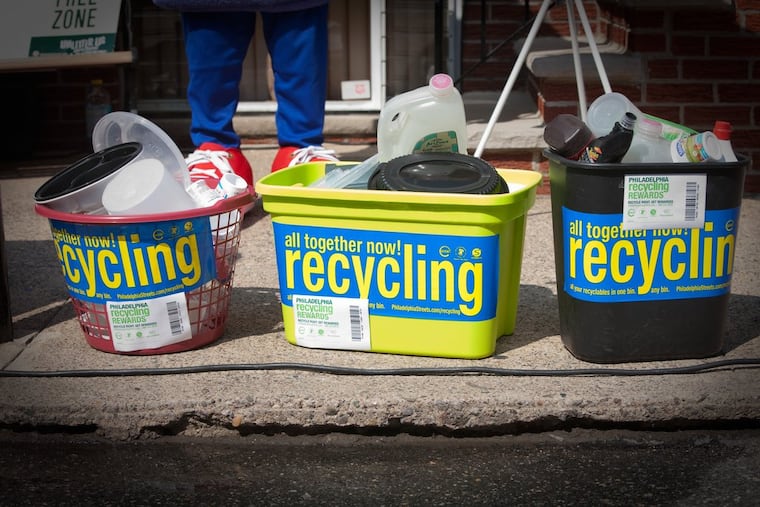How you can help Philly cut costs when it comes to recycling | Opinion
Due to recent changes in the overseas market, we now pay more than $75 per ton to sort and market our recycling, more than we pay for trash disposal.

Thursday is America Recycles Day, a national initiative sponsored by Keep America Beautiful, to highlight recycling practices across the nation. On Nov. 15, the Philadelphia Streets Department will host a celebratory pop-up event in Love Park, with an emphasis on cleaning the recycling stream to reduce contamination.
Philadelphians should be commended for their recycling habits. For nearly 20 years, the Philadelphia Department of Streets has generated revenue by collecting such recyclables as paper, plastic, cardboard, glass, and metal. Collection has nearly tripled since 2006 to more than 100,000 tons per year. At one point, the City was receiving upwards of $65 per ton for the materials, generating millions in revenue.
But we face an uphill battle. Due to changes in the overseas market, we now pay more than $75 per ton to sort and market our recycling, more than we pay for trash disposal. Stringent new regulations have had a major impact on the recycling market, driving up costs drastically for many municipalities and cities. Our recycling stream must be cleaner to meet acceptable contamination rates, which is an ongoing challenge.
To keep our recycling rates high, residents can help the city and our planet by reducing what they consume, reusing or repurposing items often, and recycling right. One key rule to remember: When in doubt, keep it out. Here are a few more tips:
Wash, rinse, and dry your plastics, aluminum, and steel containers. It is important to remove all food waste.
Absolutely, positively no plastic bags. You may think they are recyclable, but our facilities cannot process or remove them at the plant. Check instead with your local grocery store — many of them take plastic bags to be recycled, often into reusable bags.
Put a lid on your outdoor recycling can — wet paper, cardboard, and other wet materials cannot be processed. We now offer lids for city recycling bins at our Sanitation Convenience Centers.
Styrofoam is not acceptable; reuse it or put it in the trash.
Avoid products whose packaging might say they are recyclable, but in fact can't be processed by our local plants. Hoses, cords, and electronics damage the equipment and are a potential hazard for workers.
Focus on aluminum and steel cans and plastic containers, which represent 75 percent of the value of the materials collected by the city, yet only make up 7 percent of what we see in curbside pickup. Currently, only about half of these materials end up in recycling bins, the other half in the trash. If we increase this amount, we'll raise the value of the city's materials significantly.
Long-term solutions will require companies to innovate and make products that break down easily, invest in better technological processing, and modify the materials accepted curbside.
It's going to take a team effort. On America Recycles Day, join us by taking the pledge to clean up our recycling stream and practice the three R's: Reduce. Reuse. Recycle.
Carlton Williams is commissioner of the Philadelphia Department of Streets.